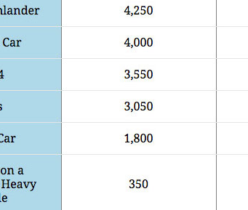We include products we think are useful for our readers. If you buy through links on this page, we may earn a small commission or other tangible benefit. Wellos and Healthline Media are owned by RVO Health. Here’s our process.
Healthline only shows you brands and products that we stand behind.
Making a few simple life changes can help promote long-lasting weight loss for women. Doing just 1 or 2 of these each day can help maximize results and promote healthy, sustainable weight loss.
Diet and exercise may be key components of weight loss for women, but many other factors play a role.
In fact, studies show that everything from sleep quality to stress levels can have a major impact on hunger, metabolism, body weight, and belly fat.
Fortunately, making a few small changes in your daily routine can bring big benefits when it comes to weight loss.
Here are the top 23 weight loss tips for women.
Refined carbs undergo extensive processing, reducing the amount of fiber and micronutrients in the final product.
These foods spike blood sugar levels, increase hunger, and are associated with increased body weight and belly fat (
Therefore, it’s best to limit refined carbs like white bread, pasta, and prepackaged foods. Opt for whole-grain products like oats, brown rice, quinoa, buckwheat, and barley instead.
Resistance training builds muscle and increases endurance.
It’s especially beneficial for women over 50, as it increases the number of calories that your body burns at rest. It also helps preserve bone mineral density to protect against osteoporosis (
Lifting weights, using gym equipment, or performing body-weight exercises are a few simple ways to get started.
Drinking more water is an easy and effective way to promote weight loss with minimal effort.
According to one small study, drinking 16.9 ounces (500 ml) of water temporarily increased the number of calories burned by 30% after 30–40 minutes (
Studies also show that drinking water before a meal can increase weight loss and reduce the number of calories consumed by around 13% (
Protein foods like meat, poultry, seafood, eggs, dairy, and legumes are an important part of a healthy diet, especially when it comes to weight loss.
In fact, studies note that following a high-protein diet can cut cravings, increase feelings of fullness, and boost metabolism (
One small 12-week study also found that increasing protein intake by just 15% decreased daily calorie intake by an average of 441 calories — resulting in 11 pounds (5 kg) of weight loss (
Studies suggest that getting enough sleep may be just as crucial to losing weight as diet and exercise.
Multiple studies have associated sleep deprivation with increased body weight and higher levels of ghrelin, the hormone responsible for stimulating hunger (
Furthermore, one study in women showed that getting at least seven hours of sleep each night and improving overall sleep quality increased the likelihood of weight loss success by 33% (
Aerobic exercise, also known as cardio, increases your heart rate to burn extra calories.
Studies show that adding more cardio to your routine can result in significant weight loss — especially when paired with a healthy diet (
For best results, aim for at least 20–40 minutes of cardio per day, or around 150–300 minutes per week (
Using a food journal to track what you eat is an easy way to hold yourself accountable, and make healthier choices.
It also makes it easier to count calories, which can be an effective strategy for weight management (
What’s more, a food journal can help you stick to your goals, and may result in greater long-term weight loss (
Adding more fiber to your diet is a common weight loss strategy to help slow the emptying of your stomach and keep you feeling fuller for longer (
Without making any other changes to diet or lifestyle, increasing dietary fiber intake by 14 grams per day has been associated with a 10% decrease in calorie intake and 4.2 pounds (1.9 kg) of weight loss over 3.8 months (
Fruits, vegetables, legumes, nuts, seeds, and whole grains are all great sources of fiber that can be enjoyed as part of a balanced diet.
Mindful eating involves minimizing external distractions during your meal. Try eating slowly and focusing your attention on how your food tastes, looks, smells, and feels.
This practice helps promote healthier eating habits and is a powerful tool for increasing weight loss (
Studies show that eating slowly can enhance feelings of fullness and may lead to significant reductions in daily calorie intake (
Selecting healthy, low-calorie snacks is a great way to lose weight and stay on track by minimizing hunger levels between meals.
Choose snacks that are high in protein and fiber to promote fullness and curb cravings.
Whole fruit paired with nut butter, veggies with hummus, or Greek yogurt with nuts are examples of nutritious snacks that can support long-lasting weight loss.
Although fad diets often promise quick weight loss, they can do more harm than good when it comes to your waistline and your health.
For example, one study in college women showed that eliminating certain foods from their diet increased cravings and overeating (
Fad diets can also promote unhealthy eating habits and lead to yo-yo dieting, both of which are detrimental to long-term weight loss.
When you’re pressed for time and unable to fit in a full workout, squeezing more steps into your day is an easy way to burn extra calories and increase weight loss.
In fact, it’s estimated that non-exercise-related activity may account for 50% of the calories your body burns throughout the day (
Taking the stairs instead of the elevator, parking further from the door, or taking a walk during your lunch break are a few simple strategies to bump up your total number of steps and burn more calories.
Setting SMART goals can make it easier to reach your weight loss goals while also setting you up for success.
SMART goals should be specific, measurable, achievable, relevant, and time-bound. They should hold you accountable and lay out a plan for how to reach your goals.
For example, instead of simply setting a goal to lose 10 pounds, set a goal to lose 10 pounds in 3 months by keeping a food journal, going to the gym 3 times per week, and adding a serving of vegetables to each meal.
Some studies suggest that increased stress levels can contribute to a higher risk of weight gain over time (
Stress may also alter eating patterns and contribute to issues like overeating and binging (
Exercising, listening to music, practicing yoga, journaling, and talking to friends or family are several easy and effective ways to lower stress levels.
High-intensity interval training, also known as HIIT, pairs intense bursts of movement with brief recovery periods to help keep your heart rate elevated.
Swapping cardio for HIIT a few times per week can amp up weight loss.
HIIT can decrease belly fat, increase weight loss, and has been shown to burn more calories than other activities, such as biking, running, and resistance training (
Switching to a smaller plate size may help promote portion control, aiding weight loss.
Although research remains limited and inconsistent, one study showed that participants who used a smaller plate ate less and felt more satisfied than those who used a normal-size plate (
Using a smaller plate can also limit your portion size, which can reduce your risk of overeating and keep calorie consumption in check.
Probiotics are a type of beneficial bacteria that can be consumed through food or supplements to help support gut health.
Studies show that probiotics can promote weight loss by increasing the excretion of fat and altering hormone levels to reduce appetite (
In particular, Lactobacillus gasseri is a strain of probiotic that’s especially effective. Studies show that it can help decrease belly fat and overall body weight (
Studies show that practicing yoga can help prevent weight gain and increase fat burning (
Yoga can also decrease stress levels and anxiety — both of which may be tied to emotional eating (
Additionally, practicing yoga has been shown to reduce binge eating and prevent preoccupation with food to support healthy eating behaviors (
Making a conscious effort to chew slowly and thoroughly can help increase weight loss by cutting down on the amount of food you eat.
According to one study, chewing 50 times per bite significantly decreased calorie intake compared to chewing 15 times per bite (
Another study showed that chewing food either 150% or 200% more than normal reduced food intake by 9.5% and 14.8%, respectively (
Enjoying a nutritious breakfast first thing in the morning can help start your day off on the right foot and keep you feeling full until your next meal.
In fact, studies find that sticking to a regular eating pattern may be linked to a reduced risk of binge eating (
Eating a high-protein breakfast has been shown to decrease levels of the hunger-promoting hormone ghrelin. This can help keep appetite and hunger under control (
Intermittent fasting involves alternating between eating and fasting for a specific window of time each day. Periods of fasting typically last 14–24 hours.
Intermittent fasting is thought to be as effective as cutting calories when it comes to weight loss (
It may also help enhance metabolism by increasing the number of calories burned at rest (
Processed foods are typically high in calories, sugar, and sodium — yet low in important nutrients like protein, fiber, and micronutrients.
Studies show that consuming more processed foods is associated with excess body weight — especially among women (
Therefore, it’s best to limit your intake of processed foods and opt for whole foods, such as fruits, vegetables, healthy fats, lean proteins, whole grains, and legumes.
Added sugar is a major contributor to weight gain and serious health issues, such as diabetes and heart disease (
Foods high in added sugar are loaded with extra calories but lacking in the vitamins, minerals, fiber, and protein that your body needs to thrive.
For this reason, it’s best to minimize your intake of sugary foods like soda, candy, fruit juice, sports drinks, and sweets to help promote weight loss and optimize overall health.
Many different factors play a role in weight loss, and some extend far beyond diet and exercise.
Making a few simple modifications to your lifestyle can help promote long-lasting weight loss for women.
Including even one or two of these strategies in your daily routine can help maximize results and promote healthy, sustainable weight loss.
Our experts continually monitor the health and wellness space, and we update our articles when new information becomes available.
Current Version
Oct 30, 2023
Written By
Rachael Ajmera, MS, RD
Edited By
Frank Crooks
Share this article
OUR BRANDS


